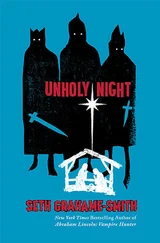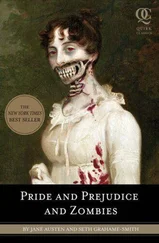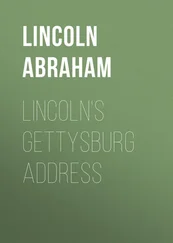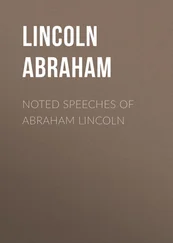Upstairs, Mary Lincoln held her husband’s hand. She stole a glance at Clara Harris, whose hands were resting modestly in her lap, and whispered in Abe’s ear, “What will Ms. Harris think of my hanging on to you so?”
“She won’t think anything of it.”
Most historians agree that these are Abraham Lincoln’s last words.
Booth quietly climbed the staircase and stood outside the box, waiting for the one line that he knew would get a huge laugh.
A laugh big enough to muffle the sound of a pistol.
Onstage, Harry Hawk stood alone, delivering a spirited soliloquy to the crowd. Booth held steady, waiting, as Hawk’s voice boomed through the theater. He crept forward, leveled the pistol at the back of Lincoln’s head, and carefully… carefully pulled the hammer back. If Abe had been ten years younger, he might have heard the click —might’ve reacted with the speed and strength that had saved his life so many times before. But he was old. Tired. All he felt was Mary’s hand upon his. All he heard was Harry Hawk’s booming voice: “Don’t know the manners of good society, eh? Well, I guess I know enough to turn you inside out, old gal; you sockdologizing old man-trap!”
The audience roared. Booth fired.
The ball entered Abe’s skull, and he slumped forward in his rocking chair, unconscious. Mary’s screams joined the deafening laughter as Booth produced a hunting knife and turned to his next target—but instead of General Grant, he was met by the young Major Rathbone, who leapt from his chair and came at him. Booth plunged the knife into Rathbone’s bicep and made for the railing. Clara’s screams joined Mary’s as laughter gave way to murmuring and people turned their heads toward the commotion. Rathbone grabbed Booth’s coat with his good arm, but couldn’t hold on. Booth leapt over the railing. But as he did, one of his riding spurs snagged the Treasury flag that Edmund Spangler had put up earlier in the day. Booth fell awkwardly to the stage, breaking his left leg, twisting it grotesquely at the knee.
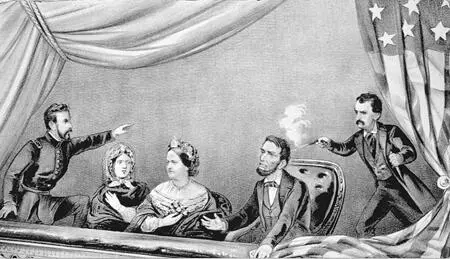
FIG. 6E. - A BLACK-EYED JOHN WILKES BOOTH FIRES THE FATAL SHOT AS MAJOR HENDRY RATHBONE REACTS
Though injured, the consummate actor couldn’t resist a flourish. He pulled himself to his feet, faced the audience, which had begun to panic, and yelled, “Sic semper tyrannis!” The state motto of Virginia. Thus always to tyrants! With that, John Wilkes Booth left the stage for the last time.
Like the speech to his conspirators, it was a moment he’d probably rehearsed.
VI
At roughly the same moment, Lewis Powell ran out of Secretary Seward’s front door, screaming, “I’m mad! I’m mad!” Although he didn’t know it yet, his mission had been a failure.
Herold, the nervous pharmacist, had done his part. He’d led Powell to Seward’s mansion. Now he watched from a safe distance as Powell knocked on the front door just after ten o’clock. When a butler answered, Powell delivered his own carefully rehearsed line: “Good evening. I have medicine for the secretary. I alone am to administer it.” Moments later, he was on the second floor, only a few yards from where his ailing target slept. But before he could slip into Seward’s room alone, the secretary’s son Frederick approached.
“What cause have you to see my father?”
Powell repeated his carefully rehearsed line, word for word. But the younger Seward wasn’t convinced. Something was amiss. He told Powell that his father was asleep, and to call again in the morning.
Lewis Powell had no choice. He drew his revolver, pointed it at Frederick’s head, and squeezed the trigger. Nothing. The gun had misfired.
I’m mad! I’m mad!
There was no time. Powell bashed Frederick’s skull with the gun instead, sending him to the floor, blood pouring from his nose and ears. Powell then ran into his target’s room, where he encountered a screaming Fanny Seward, the secretary’s daughter. Ignoring her for the moment, he drew his knife and brought it down on the old man’s face and neck, again and again and again, until he rolled onto the floor—dead.
Or so Powell thought. Seward was wearing a metal neck brace as a result of his carriage accident. Despite deep gashes to his face, the blade failed to find his jugular.
Powell stabbed Fanny Seward in the hands and arms as he ran past her and into the hallway. Continuing down the staircase, another of the secretary’s children, Augustus, and an overnight guest, Sergeant Robinson, tried to stop him. Both were stabbed for their efforts, as was Emerick Hansell, a telegram messenger who’d had the misfortune to arrive at the front door just as Powell was running out of it.
Incredibly, none of the victims died.
Outside, the nervous pharmacist was nowhere to be found. The sound of Fanny Seward’s screams had frightened him off. Powell, who knew little of the area, was left to fend for himself. He threw the bloody knife into a nearby gutter, untied his horse, and galloped off into the night.
As disastrous as the attack on Seward had been, Powell could have consoled himself in the knowledge that he’d fared far better than George Atzerodt. The reluctant German had lost his nerve, gotten drunk in the bar at the vice president’s boardinghouse, and then wandered the streets of Washington until sunrise.
VII
Charles Leale, twenty-three, helped his fellow soldiers lower the president onto a bed on the first floor of Petersen’s Boarding House—directly across the street from Ford’s Theater. They were forced to lay him diagonally, as he was too tall to lie straight. Leale, an army surgeon who’d been in the audience, had been the first to attend to the president. He’d shoved his way through the crowd, up the narrow stairs, and into the box, where he’d found Lincoln slumped over in his chair. Upon lowering the president and examining him, he’d detected no pulse; no breath. Moving quickly, the young doctor had felt around the back of Lincoln’s head until he’d found a hole just behind the left ear. After a blood clot was removed from the wound, Lincoln had begun to breathe again.
Leale was young, but he wasn’t naive. He’d seen enough of these injuries in the field to know the outcome. Minutes after the president had been shot, he’d delivered his bleak, accurate medical opinion: “His wound is mortal. It is impossible for him to recover.”
Mary couldn’t bear to be in the room with her dying husband. She remained in the parlor of Petersen’s Boarding House all night, weeping. Robert and Tad arrived sometime after midnight and took their place at Abe’s bedside, just as Abe had knelt at his dying mother’s side almost fifty years earlier. They were joined by Gideon Welles, Edwin Stanton, and an endless parade of Washington’s best doctors, all of whom came to offer their advice. But nothing could be done. Dr. Robert King Stone, the Lincolns’ family physician, examined the president during the night and concluded that his case was “hopeless.”
It was only a matter of time.
By sunrise, a large crowd had gathered outside. The president’s breathing had become increasingly faint through the night, his heartbeat erratic. He was cool to the touch. Many of the doctors remarked that a wound of this type would have killed most men in two hours; maybe less. Abe had lasted nine. But then, Abe Lincoln had always been different. Abe Lincoln had always lived.
The infant a mother attended and loved;
The mother that infant’s affection who proved;
The husband that mother and infant who blessed,
Читать дальше


